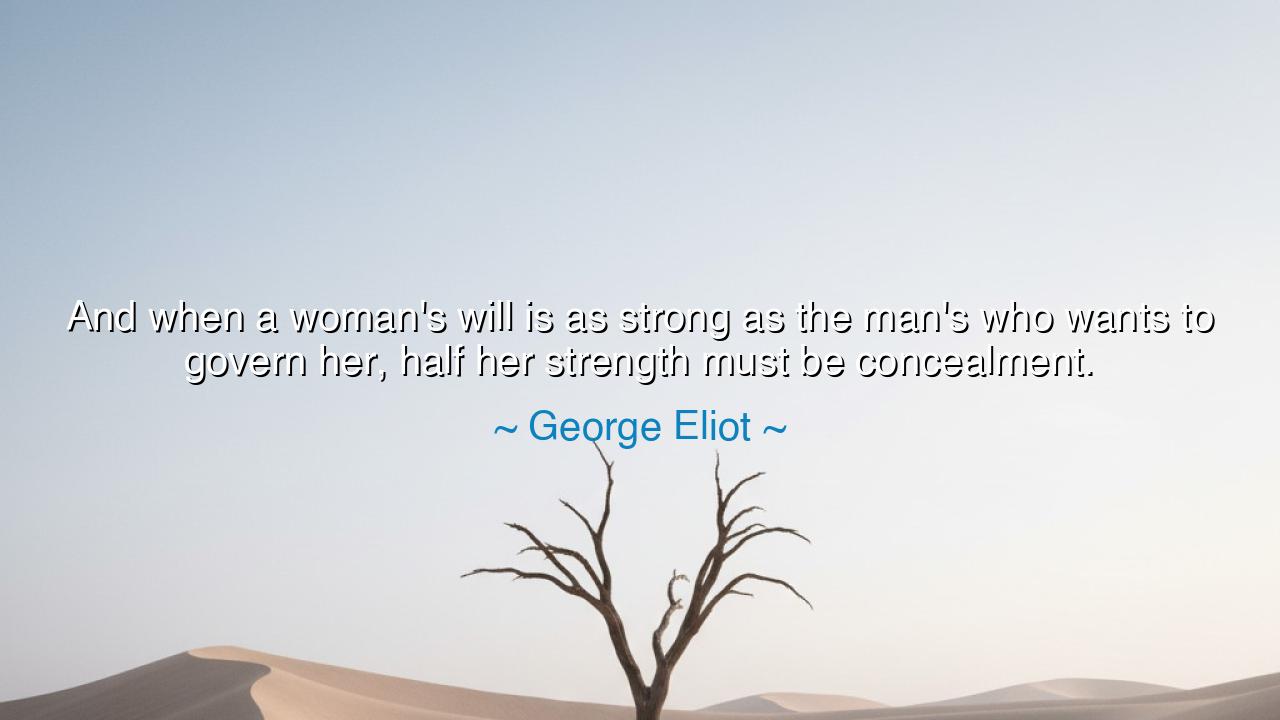
And when a woman's will is as strong as the man's who wants to
And when a woman's will is as strong as the man's who wants to govern her, half her strength must be concealment.






Hear the words of George Eliot, the wise woman who clothed her truth in the voice of men, for in her time such was necessary. She proclaimed: “And when a woman’s will is as strong as the man’s who wants to govern her, half her strength must be concealment.” These words are not merely observation but revelation. They speak to the hidden battles of women through the ages, to the unspoken strength veiled behind gentleness, to the quiet fire burning in the shadows of a world ruled by men.
The meaning is plain, yet profound. A woman’s will, equal in force and fervor to that of the man who seeks to command her, cannot always be shown openly. In a society that scorns her independence, that punishes her boldness, she must veil half her strength, holding it in silence, biding her time. Concealment becomes not weakness but strategy, a hidden fortress from which her spirit may endure. The hand may appear pliant, but the heart within beats with iron resolve.
History is filled with examples of such concealed strength. Recall the story of Empress Theodora of Byzantium, who rose from the humblest of beginnings to rule beside Justinian. Though she stood as empress, much of her influence was exercised not by decree, but by counsel whispered, by wisdom disguised, by patience concealed until the moment was ripe. Her strength in concealment saved Constantinople during the Nika riots, when she refused to flee and steeled her husband’s resolve. In her silence and her words, she proved that power does not always roar—it sometimes waits, hidden, until it must strike.
So too in the life of George Eliot herself, born Mary Ann Evans. In an age when women writers were dismissed, she concealed her identity under a man’s name. This concealment was not surrender, but the channeling of her strength into a form that would be heard. Her novels, rich with wisdom and moral power, shook the literary world. Had she shown her true name, the world might have ignored her. By hiding, she conquered. By silence, she spoke with greater thunder.
The lesson here is not that concealment is the ideal, but that it is sometimes the shield by which the strong survive until their time comes. A woman, or any soul oppressed, may wield patience as a weapon, endurance as armor, and subtlety as the sword hidden within the cloak. Concealment does not mean denial of power; it means its preservation until it may be revealed without destruction.
And yet Eliot’s words also carry sorrow. For they reveal the tragedy that strength, in certain times, could not shine openly but must be veiled. They remind us of the countless women whose brilliance was hidden, whose courage was unseen, whose will was cloaked in obedience while their spirit burned with silent fire. Their legacy is the lesson of endurance, and their endurance is the seed of the freedoms now more widely claimed.
The teaching for us, O listener, is this: when your strength cannot be shown, do not despair. Conceal it if you must, but never extinguish it. Guard it in silence, nurture it in patience, wield it with wisdom. And when the day comes when strength may be unveiled without fear, let it shine forth in its fullness. For the will that waits and endures becomes sharper, stronger, and more unbreakable.
So let Eliot’s words echo through time: “Half her strength must be concealment.” Understand them not as submission, but as the strategy of the strong. Conceal when you must, endure when you must, but never surrender the will within you. For strength concealed is still strength, and in the fullness of time, it becomes the force that changes the world.






AAdministratorAdministrator
Welcome, honored guests. Please leave a comment, we will respond soon